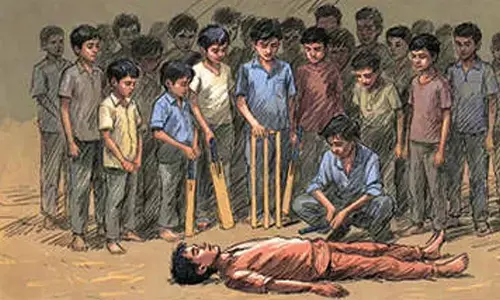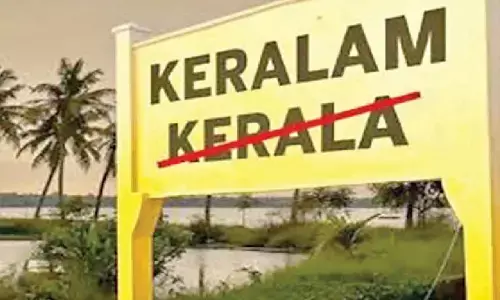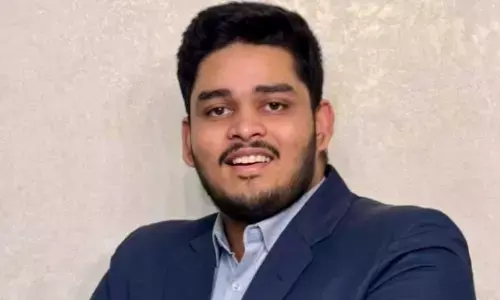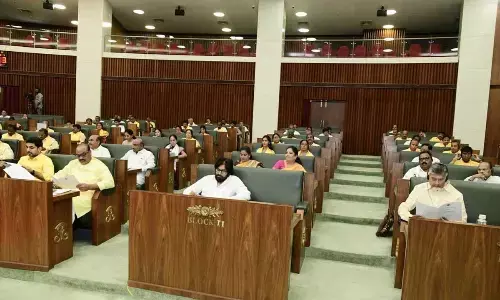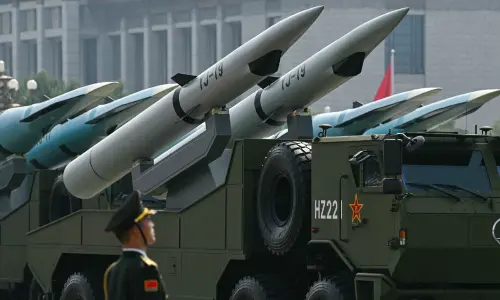Yes, Caste does matter!
Yes, Caste does matter!, 2014 elections, Janardan Dwivedi, Jaya Prakash Narayana. Caste has been practiced by everyone in the subcontinent consciously or instinctively as a habit but, repudiated invariably in public.
As the 2014 elections are fast approaching, issues that attract the attention of the voters are being stirred up. Last week Janardan Dwivedi provoked the reservation communities through an avowal to end caste-based reservations. Khap caste Panchayats were supported by Hooda while Modis entreating for OBC tag. Harish Rao of TRS has alleged caste angle against Jaya Prakash Narayana of Lok Satta voting TDP candidate. The gossip of two or three ruling castes getting united on packages irrespective of parties has compelled ruckus in Parliament, needs scrutiny. BSP-SP and several caste outfits are active now. The BCCI president Srinivasan is found in an obscure position with Mudgal report confirming his son-in-law Meiyappan in betting. This relationship is stronger than social bond of caste with international implications. The discrimination and killing of North-East Indians in Delhi are being compared with Dalits of mainland. The above cases can be taken up for a dispassionate academic discussion whether caste matters in public life.
Caste has been practiced by everyone in the subcontinent consciously or instinctively as a habit but, repudiated invariably in public. There seems to be little appreciation about the economic potential of caste, though hundreds of studies by western and Indian scholars are available. In fact, very few knew about the ecology of caste and its changing contours in different parts of India. Perhaps, everyone has a stake in the varna (caste currently), a phenomenon of reservation of caste-based occupations. Interestingly, Andhras have inadequate knowledge about the castes in Odissa or Kerala and Punjabis do not know what kind of castes exist in Bengal, Maharashtrians generalise their experience as universal without understanding its ubiquitous and diverse nature, and so on. The Western social anthropologists like Kathleen Gough and the Indian scholar Madhav Gadgil have tried to project some castes as ecology dependent, but did not elaborate the geography of castes. It was only in the modern period Rajni Kothari and others have studied the political potential of caste. But, we have very few reflections why the British skilfully adopted divide and rule here with advantage and not in other common wealth countries. Hence, we can say caste is a nasty thing not only in social relations but even to consider it for academic debate. Nevertheless, our leaders have been expressing opinions occasionally for political purpose and not necessarily to annihilate it; except Lohia and Ambedkar.
Now, look at the practice of caste-related biases in our democratic institutions, like political parties, media, social gathering, etc, to comprehend how far they are free from prejudices. For instance, who in Dwivedi’s party devise policies and influence political manoeuvrings and their share in the population? Is it evenly distributed? The same is true for other parties including some caste-based and progressive ones who started giving reservations in the party after Mandal to counter public criticism, but not essentially for decision making. Major share of the Corporate Media is held by few castes while the opinions are voiced by select few traditional castes. Though media delude all of us with the idea of freedom of speech, does it really representative of the castes in reporting or projecting issues or individuals in proportion to their legitimate share? We know how little known individuals are pampered due to their social background bereft of attainments. Is there any content analysis as to how the channels in our state represented the recent bifurcation issue? Will the dispassionate channels be allowed to survive? Is public space which should democratically be accessible to all is ever representative of our diverse caste groups? The answer is obvious.
Though many people abhor caste-based discrimination, the issue is how to eradicate it when economic opportunities are seized by few organised castes as against the multitude? Don’t we know the economic background of some of the billionaires of our state or others about five decades back and how they became super rich now? Is it not due to caste mobilisation or the so-called crony capitalism suited to our conditions? People talk about reservations in jobs of let us say (15%) scheduled castes. There are 175 lakh jobs in government (state, union, local body, public sector) where the caste-based reservations are observed. It means that there will be 26 lakh dalits in all categories of public employment. It is around one per cent (1.3) of the 20 crore dalits in India. They do only represent the disadvantaged and may not as Dwivedi remarked, allow the poor among them to occupy the positions. This is what we call a ‘phenomenon of circulation of families’. This is much worse in the case of Adivasis and the OBCs who have just begun. This is also true even among the dwija and sudra castes. It is a systemic paradox.
There are bizarrely unconventional groups who got in to power and became propertied class by seizure. How could they do it? Is it not through caste mobilisation? While the few who do not have any reservations used their caste for capturing opportunities in different names, the reservation castes do complain that they remained insecure in a market economy. Some of them might argue that it would provide prospects to grow as capitalists. But, the total asset value of all the dalits for instance, including the few neo-corporates among them is not equal to one day share value transaction of some Business Houses. How long does it take to convert at least 15 crore dalits (out of 20) and 5 crore Adivasis (out of 7 crore) as crorepathis?
The question is how to resolve this riddle? Are caste-based reservations a solution to ameliorate their conditions? No. Caste is used in India now as a socio-economic identity to target groups with some aid. Are the political parties and society prepared to face the groups if they are released from this forced incubation? More than anyone, the politicians recognise the traditional patron-client relations transforming as development messiah and aid recipient. The former is a person in power and the latter has always remained as a reservation category creature. Thus, each politician developed his own constituency, particularly among the poor on the basis of poverty alleviation schemes, caste-based reservations etc.
This must have been the longstanding convention in India. Therefore, no one is prepared to sacrifice this privilege of holding power through caste. This appears to be the fact behind the bifurcation politics in Andhra Pradesh that forged alleged unity among different political groups with same caste heads getting united to hoodwink common man? Is it the same concord that submerged sub-caste differences once the issue of abolition of reservations is initiated? That is the power of caste in India known to the ruling castes better than other groups. Yes, caste does matter today in politics and


